2020年全国统一高考英语试卷(新课标Ⅰ)-教师用卷
2020年全国新课标一卷英语

2020年全国新课标一卷英语In 2020, a new set of national curriculum standards for English language teaching in China was introduced. This new curriculum, known as the "New Standard English Curriculum", aims to improve the quality of English language education in the country and better prepare students for the challenges of the 21st century.The new curriculum places a strong emphasis on the development of students' listening, speaking, reading, and writing skills. It also seeks to cultivate students' critical thinking and problem-solving abilities, as well as their cultural awareness and communication skills.One of the key features of the new curriculum is the introduction of task-based learning. This approach encourages students to work on real-world tasks and projects that require them to use their English language skills in meaningful ways. By engaging in these tasks, students are able to develop their language proficiency in a natural and authentic context.Another important aspect of the new curriculum is the integration of technology into English language teaching. Teachers are encouraged to use digital tools and resources toenhance their lessons and provide students with opportunities to practice their language skills in interactive and engaging ways.In addition, the new curriculum emphasizes the importance of cultural understanding in language learning. Students are encouraged to explore different cultures and perspectives through the study of literature, films, and other forms of media from English-speaking countries.Overall, the new national curriculum for English language teaching in China represents a significant step towards improving the quality and effectiveness of English language education in the country. By focusing on the development of students' language skills, critical thinking abilities, and cultural awareness, the new curriculum aims to better prepare students for the challenges and opportunities of the future.。
2020年普通高等学校招生全国统一考试新课标卷I英语试题(12页)
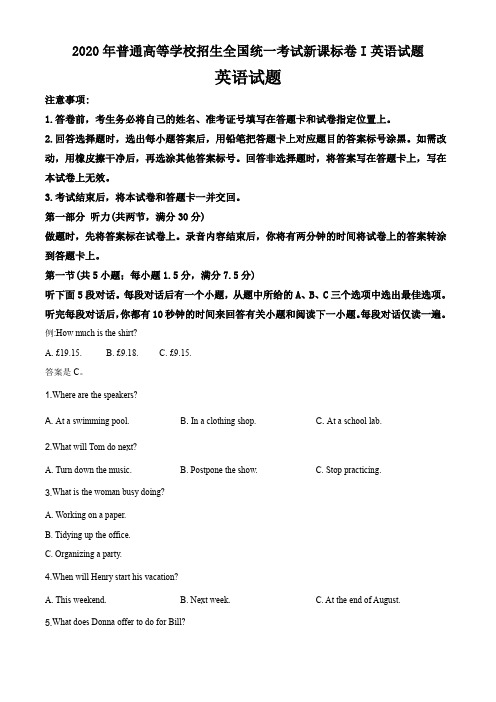
2020年普通高等学校招生全国统一考试新课标卷I英语试题英语试题注意事项:1.答卷前,考生务必将自己的姓名、准考证号填写在答题卡和试卷指定位置上。
2.回答选择题时,选出每小题答案后,用铅笔把答题卡上对应题目的答案标号涂黑。
如需改动,用橡皮擦干净后,再选涂其他答案标号。
回答非选择题时,将答案写在答题卡上,写在本试卷上无效。
3.考试结束后,将本试卷和答题卡一并交回。
第一部分听力(共两节,满分30分)做题时,先将答案标在试卷上。
录音内容结束后,你将有两分钟的时间将试卷上的答案转涂到答题卡上。
第一节(共5小题;每小题1.5分,满分7.5分)听下面5段对话。
每段对话后有一个小题,从题中所给的A、B、C三个选项中选出最佳选项。
听完每段对话后,你都有10秒钟的时间来回答有关小题和阅读下一小题。
每段对话仅读一遍。
例:How much is the shirt?A. £19.15.B. £9.18.C. £9.15.答案是C。
1.Where are the speakers?A. At a swimming pool.B. In a clothing shop.C. At a school lab.2.What will Tom do next?A. Turn down the music.B. Postpone the show.C. Stop practicing.3.What is the woman busy doing?A. Working on a paper.B. Tidying up the office.C. Organizing a party.4.When will Henry start his vacation?A. This weekend.B. Next week.C. At the end of August.5.What does Donna offer to do for Bill?A. Book a flight for him.B. Drive him to the airport.C. Help him park the car.第二节(共15小题;每小题1.5分,满分22.5分)听下面5段对话或独白。
2020年高考英语试卷(全国新高考Ⅰ卷)【word版本;可编辑;含答案】
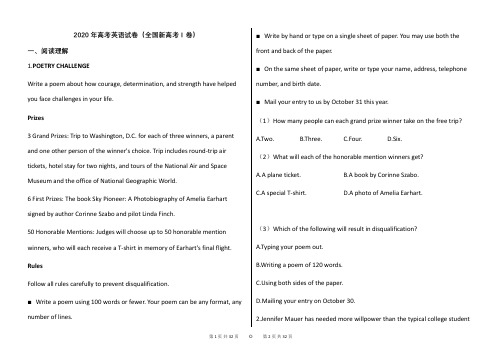
2020年高考英语试卷(全国新高考Ⅰ卷)一、阅读理解1.POETRY CHALLENGEWrite a poem about how courage, determination, and strength have helped you face challenges in your life.Prizes3 Grand Prizes: Trip to Washington, D.C. for each of three winners, a parent and one other person of the winner's choice. Trip includes round-trip air tickets, hotel stay for two nights, and tours of the National Air and Space Museum and the office of National Geographic World.6 First Prizes: The book Sky Pioneer: A Photobiography of Amelia Earhart signed by author Corinne Szabo and pilot Linda Finch.50 Honorable Mentions: Judges will choose up to 50 honorable mention winners, who will each receive a T-shirt in memory of Earhart's final flight. RulesFollow all rules carefully to prevent disqualification.■ Write a poem using 100 words or fewer. Your poem can be any format, any number of lines. ■ Write by hand or type on a single sheet of paper. You may use both the front and back of the paper.■ On the same sheet of paper, write or type your name, address, telephone number, and birth date.■ Mail your entry to us by October 31 this year.(1)How many people can each grand prize winner take on the free trip? A.Two. B.Three. C.Four. D.Six.(2)What will each of the honorable mention winners get?A.A plane ticket.B.A book by Corinne Szabo.C.A special T-shirt.D.A photo of Amelia Earhart.(3)Which of the following will result in disqualification?A.Typing your poem out.B.Writing a poem of 120 words.ing both sides of the paper.D.Mailing your entry on October 30.2.Jennifer Mauer has needed more willpower than the typical college studentto pursue her goal of earning a nursing degree. That willpower bore fruit when Jennifer graduated from University of Wisconsin-Eau Claire and became the first in her large family to earn a bachelor's degree.Mauer, of Edgar, Wisconsin, grew up on a farm in a family of 10 children. Her dad worked at a job away from the farm, and her mother ran the farm with the kids. After high school, Jennifer attended a local technical college, working to pay her tuition (学费), because there was no extra money set aside for a college education. After graduation, she worked to help her sisters and brothers pay for their schooling.Jennifer now is married and has three children of her own. She decided to go back to college to advance her career and to be able to better support her family while doing something she loves: nursing. She chose the UW-Eau Claire program at Ministry Saint Joseph Hospital in Marshfield because she was able to pursue her four-year degree close to home. She could drive to class and be home in the evening to help with her kids. Jennifer received great support from her family as she worked to earn her degree: Her husband worked two jobs to cover the bills, and her 68-year-old mother helped take care of the children at times.Through it all, she remained in good academic standing and graduated with honors. Jennifer sacrificed (牺牲)to achieve her goal, giving up many nights with her kids and missing important events to study. "Some nights my heart was breaking to have to pick between my kids and studying for exams or papers," she says. However, her children have learned an important lesson witnessing their mother earn her degree. Jennifer is a first-generation graduate and an inspiration to her family—and that's pretty powerful.(1)What did Jennifer do after high school?A.She helped her dad with his work.B.She ran the family farm on her own.C.She supported herself through college.D.She taught her sisters and brothers at home.(2)Why did Jennifer choose the program at Ministry Saint Joseph's Hospital in Marshfield?A.To take care of her kids easily.B.To learn from the best nurses.C.To save money for her parents.D.To find a well-paid job there.(3)What did Jennifer sacrifice to achieve her goal?A.Her health.B.Her time with family.C.Her reputation.D.Her chance of promotion.(4)What can we learn from Jennifer's story?A.Time is money.B.Love breaks down barriers.C.Hard work pays off.cation is the key to success.3.In the mid-1990s, Tom Bissell taught English as a volunteer in Uzbekistan. He left after seven months, physically broken and having lost his mind. A few years later, still attracted to the country, he returned to Uzbekistan to write an article about the disappearance of the Aral Sea.His visit, however, ended up involving a lot more than that. Hence this book, Chasing the Sea: Lost Among the Ghosts of Empire in Central Asia, which talks about a road trip from Tashkent to Karakalpakstan, where millions of lives have been destroyed by the slow drying up of the sea. It is the story of an American travelling to a strange land, and of the people he meets on his way: Rustam, his translator, a lovely 24-year-old who picked up his colorful English in California, Oleg and Natasha, his hosts in Tashkent, and a string of foreign aid workers.This is a quick look at life in Uzbekistan, made of friendliness and warmth, but also its darker side of society. In Samarkand, Mr Bissell admires the architectural wonders, while on his way to Bukhara he gets a taste of police methods when suspected of drug dealing. In Ferghana, he attends a mountain funeral (葬礼)followed by a strange drinking party. And in Karakalpakstan, he is saddened by the dust storms, diseases and fishing boats stuck miles from the sea.Mr Bissell skillfully organizes historical insights and cultural references, making his tale a well-rounded picture of Uzbekistan, seen from Western eyes. His judgment and references are decidedly American, as well as his delicate stomach. As the author explains, this is neither a travel nor a history book, or even a piece of reportage. Whatever it is, the result is a fine and vivid description of the purest of Central Asian traditions.(1)What made Mr Bissell return to Uzbekistan?A.His friends' invitation.B.His interest in the country.C.His love for teaching.D.His desire to regain health.。
2020年全国普通高等学校招生统一考试英语试卷 全国Ⅰ卷(含答案)

2020年普通高等学校招生全国统一考试(全国卷I)英语注意事项:1. 答卷前,考生务必将自己的姓名、准考证号填写在答题卡和试卷指定位置上。
2. 回答选择题时,选出每小题答案后,用铅笔把答题卡上对应题目的答案标号涂黑。
如需改动,用橡皮擦干净后,再选涂其他答案标号。
回答非选择题时,将答案写在答题卡上,写在本试卷上无效。
3. 考试结束后,将本试卷和答题卡一并交回。
版本一:河南、山西等第一部分听力(共两节,满分30分)做题时,先将答案标在试卷上。
录音内容结束后,你将有两分钟的时间将试卷上的答案转涂到答题卡上。
第一节(共5小题;每小题1.5分,满分7.5分)听下面5段对话。
每段对话后有一个小题,从题中所给的A、B、C三个选项中选出最佳选项。
听完每段对话后,你都有10秒钟的时间来回答有关小题和阅读下一小题。
每段对话仅读一遍。
例:How much is the shirt?A. £19.15.B. £9.18.C. £9.15.答案是C。
1. Where are the speakers?A. At a swimming pool.B. In a clothing shop.C. At a school lab.2. What will Tom do next?A. Turn down the music.B. Postpone the show.C. Stop practicing.3. What is the woman busy doing?A. Working on a paper.B. Tidying up the office.C. Organizing a party.4. When will Henry start his vacation?A. This weekend.B. Next week.C. At the end ofAugust.5. What does Donna offer to do for Bill?A. Book a flight for him.B. Drive him to the airport.C. Help him park thecar.第二节(共15小题;每小题1.5分,满分22.5分)听下面5段对话或独白。
2020年普通高等学校招生全国统一考试新课标卷I英语试题答案详解点睛教师版(25页)
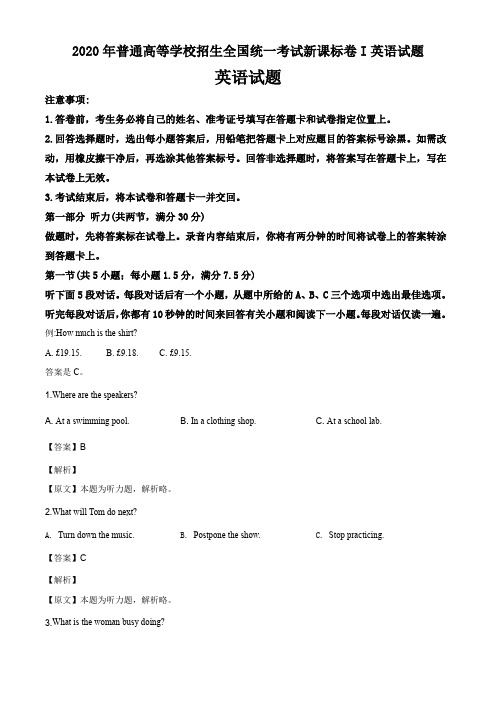
A.Forgiving.B.Sympathetic.C.Supportive.
10.What might Cathy do for the preB.Train a new person.C.Recommend an engineer.
12.What did the man say helped him overcome the problem?
A.Patience.
B.Luck.
C.Determination.
13.What is the woman doing?
A.Conducting an interview.
B.Holding a press conference.
C.It’s worth the money.
【答案】14. C 15. A 16. C
【解析】
【原文】本题为听力题,解析略。
听下面一段独白,回答以下小题。
17.Where is Jeff from?
A.Liverpool.
B.Coventry.
C.Newcastle.
A.Working on a paper.
B.Tidying up the office.
anizing a party.
【答案】C
【解析】
【原文】本题为听力题,解析略。
4.When will Henry start his vacation?
A.This weekend.B.Next week.C.At the end of August.
【答案】6. A 7. B
【解析】
【原文】本题为听力题,解析略。
2020年全国统一高考英语试卷(Ⅰ卷)-教师用卷

2020年全国统一高考英语试卷(Ⅰ卷)一、阅读理解:本大题共15小题,共30分。
ATrain InformationAll customers travelling on TransLink services must be in possession of(拥有)a valid(有效的)ticket before boarding.For ticket information,please ask at your local station or call131230.While Queensland Rail makes every effort to ensure trains run as scheduled,there can be no guarantee(保证)of connections between trains or between train services and bus services.Lost property(失物招领)Call Lost Property on131617during business hours for items lost on Queensland Rail services.The lost property office is open Monday to Friday7:30am to5:00pm and is located at Roma Street station.Public holidaysOn public holidays,generally a Sunday timetable operates.On certain major event days,i.e.Australia Day,Anzac Day,sporting and cultural days,special additional services may operate.Christmas Day services operate to a Christmas Day timetable.Before travel please visit .au or call TransLink on131230anytime. Customers using mobility devicesMany stations have wheelchair access from the car park or entrance to the station platforms.For assistance(帮助), please call Queensland Rail on131617.Guardian trains(outbound)Depart Origin Destination Arrive6:42pm Altandi Varsity Lakes7:37pm7:29pm Central Varsity Lakes8:52pm8:57pm Fortitude Valley Varsity Lakes9:52pm11:02pm Roma Street Varsity Lakes12:22am1.What would you do to get ticket information?A.Call131617.B.Visit .au.C.Ask at the local station.D.Check the train schedule.2.At which station can you find the lost property office?A.Altandi.B.Roma Street.C.Varsity Lakes.D.Fortitude Valley.3.Which train would you take if you go from Central to Varsity Lakes?A.6:42pm.B.7:29pm.C.8:57pm.D.11:02pm.【答案】C、B、B【解析】【文章大意】本文是列车运行信息,失物招领等几则广告的内容。
2020年普通高等学校招生全国统一考试英语试题(新课标卷,解析版)
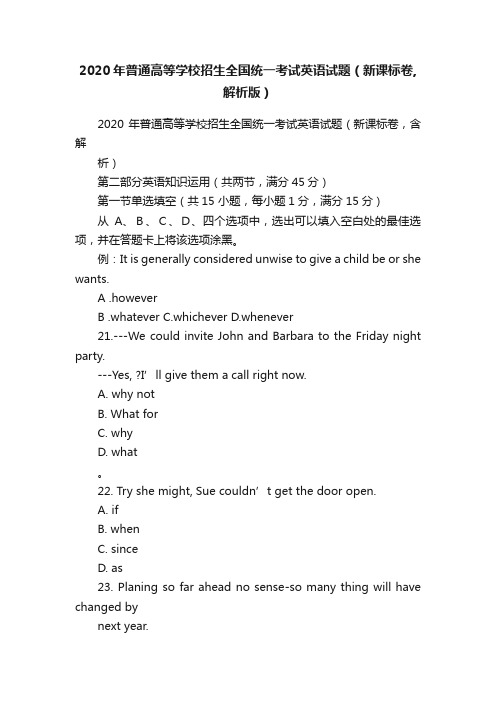
2020年普通高等学校招生全国统一考试英语试题(新课标卷,解析版)2020年普通高等学校招生全国统一考试英语试题(新课标卷,含解析)第二部分英语知识运用(共两节,满分45分)第一节单选填空(共15 小题,每小题1分,满分15分)从A、B、C、D、四个选项中,选出可以填入空白处的最佳选项,并在答题卡上将该选项涂黑。
例:It is generally considered unwise to give a child be or she wants.A .howeverB .whatever C.whichever D.whenever21.---We could invite John and Barbara to the Friday night party.---Yes, ?I’ll give them a call right now.A. why notB. What forC. whyD. what。
22. Try she might, Sue couldn’t get the door open.A. ifB. whenC. sinceD. as23. Planing so far ahead no sense-so many thing will have changed bynext year.A.madeB.is makingC.makesD.has made24.I wasn’t sure if he was really interested or if he polite.A.was just beingB.will just beC.had just beenD.would just be25.-Someone wants you on the phone.- nobody knows I am here.A.AlthoughB.AndC.ButD.So26.I can the house being untidy, but I hate it if it’s not clean.A. come up withB.put up withC. turn toD.stick to27.The next thing he saw was smoke from behind the house.A.roseB.risingC. to riseD.risen28.Only when he reached the tea-house it was the same place he’d been in last year.A. he realizedB.he did realizeC.realized heD.did he realize29.When Alice came to, she did not know how long she there.A.had been lyingB.has been lyingC.was lyingD.has lain30.The form cannot be signed by anyone yourself.A.rather thanB.other thanC.more thanD.better than31.The prize will go to the writer story shows the most imagination.A.thatB.whichC.whoseD.what32.They have arrived at lunchtime but their flight was delayed.A.willB.canC.mustD.should33.It is generally accepted that boy must learn to stand up and fight like man.A.a;aB.a;theC.the;theD.a;不填34.William found it increasingly difficult to read, for his eyesight was beginning to .A.disappearB.fallC.failD.damage35.—Artistic people can be very difficult sometimes.—Well, you married one. .A.You name itB.I’ve got itC.I can’t agree mor eD.You should know第二节完形填空(共20小题:每小题1.5分,满分30分)阅读下面的短文,从短文后各题所给的四个选项(A、B、C和D)中,选出可以填入空白处的最佳选项,并在答题卡上将该项涂黑。
2020年全国普通高等学校招生统一考试英语试卷 全国Ⅰ卷(含答案)
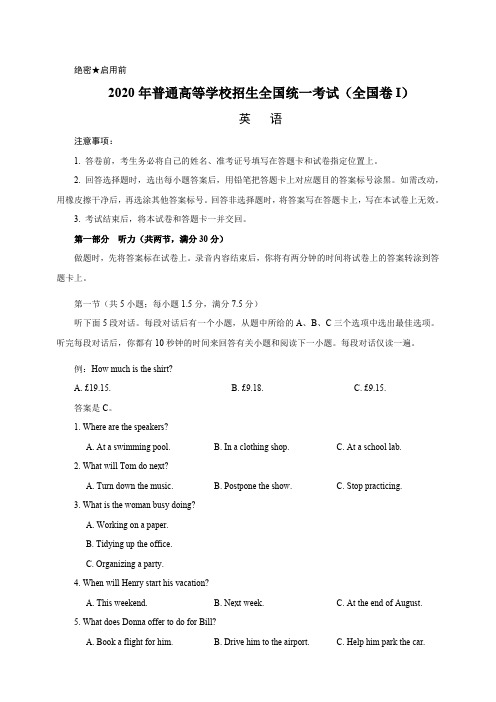
绝密★启用前2020年普通高等学校招生全国统一考试(全国卷I)英语注意事项:1. 答卷前,考生务必将自己的姓名、准考证号填写在答题卡和试卷指定位置上。
2. 回答选择题时,选出每小题答案后,用铅笔把答题卡上对应题目的答案标号涂黑。
如需改动,用橡皮擦干净后,再选涂其他答案标号。
回答非选择题时,将答案写在答题卡上,写在本试卷上无效。
3. 考试结束后,将本试卷和答题卡一并交回。
第一部分听力(共两节,满分30分)做题时,先将答案标在试卷上。
录音内容结束后,你将有两分钟的时间将试卷上的答案转涂到答题卡上。
第一节(共5小题;每小题1.5分,满分7.5分)听下面5段对话。
每段对话后有一个小题,从题中所给的A、B、C三个选项中选出最佳选项。
听完每段对话后,你都有10秒钟的时间来回答有关小题和阅读下一小题。
每段对话仅读一遍。
例:How much is the shirt?A. £19.15.B. £9.18.C. £9.15.答案是C。
1. Where are the speakers?A. At a swimming pool.B. In a clothing shop.C. At a school lab.2. What will Tom do next?A. Turn down the music.B. Postpone the show.C. Stop practicing.3. What is the woman busy doing?A. Working on a paper.B. Tidying up the office.C. Organizing a party.4. When will Henry start his vacation?A. This weekend.B. Next week.C. At the end of August.5. What does Donna offer to do for Bill?A. Book a flight for him.B. Drive him to the airport.C. Help him park the car.第二节(共15小题;每小题1.5分,满分22.5分)听下面5段对话或独白。
2020年高考全国卷Ⅰ英语试题及答案(WORD版)
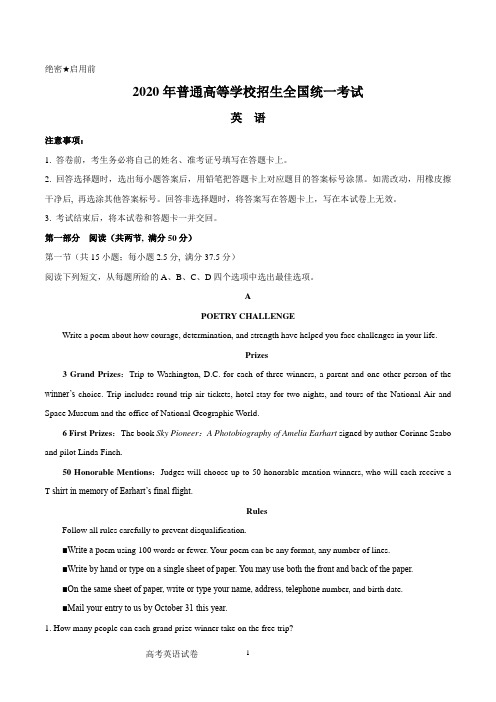
绝密★启用前2020年普通高等学校招生全国统一考试英语注意事项:1. 答卷前,考生务必将自己的姓名、准考证号填写在答题卡上。
2. 回答选择题时,选出每小题答案后,用铅笔把答题卡上对应题目的答案标号涂黑。
如需改动,用橡皮擦干净后, 再选涂其他答案标号。
回答非选择题时,将答案写在答题卡上,写在本试卷上无效。
3. 考试结束后,将本试卷和答题卡一并交回。
第一部分阅读(共两节, 满分50分)第一节(共15小题;每小题2.5分, 满分37.5分)阅读下列短文,从每题所给的A、B、C、D四个选项中选出最佳选项。
APOETRY CHALLENGEWrite a poem about how courage, determination, and strength have helped you face challenges in your life.Prizes3 Grand Prizes:Trip to Washington, D.C. for each of three winners, a parent and one other person of the winner’s choice. Trip includes round-trip air tickets, hotel stay for two nights, and tours of the National Air and Space Museum and the office of National Geographic World.6 First Prizes:The book Sky Pioneer:A Photobiography of Amelia Earhart signed by author Corinne Szabo and pilot Linda Finch.50 Honorable Mentions:Judges will choose up to 50 honorable mention winners, who will each receive a T-shirt in memory of Earhart’s final flight.RulesFollow all rules carefully to prevent disqualification.■Write a p oem using 100 words or fewer. Your poem can be any format, any number of lines.■Write by hand or type on a single sheet of paper. You may use both the front and back of the paper.■On the same sheet of paper, write or type your name, address, telephone number, and birth date.■Mail your entry to us by October 31 this year.1. How many people can each grand prize winner take on the free trip?A. Two.B. Three.C. Four.D. Six.2. What will each of the honorable mention winners get?A. A plane ticket.B. A book by Corinne Szabo.C. A special T-shirt.D. A photo of Amelia Earhart.3. Which of the following will result in disqualification?A. Typing your poem out.B. Writing a poem of 120 words.C. Using both sides of the paper.D. Mailing your entry on October 30.BJenifer Mauer has needed more willpower than the typical college student to pursue her goal of earning a nursing degree. That willpower bore fruit when Jennifer graduated from University of Wisconsin-Eau Claire and became the first in her large family to earn a bachelor’s degree.Mauer, of Edgar, Wisconsin, grew up on a farm in a family of 10 children. Her dad worked at a job away from the farm, and her mother ran the farm with the kids. After high school, Jennifer attended a local technical college, working to pay her tuition(学费), because there was no extra money set aside for a college education. After graduation, she worked to help her sisters and brothers pay for their schooling.Jennifer now is married and has three children of her own. She decided to go back to college to advance her career and to be able to better support her family while doing something she loves: nursing. She chose the UW-Eau Claire program at Ministry Saint Joseph’s Hospital in Marshfield because she was able to pursue her four-year degree close to home. She could drive to class and be home in the evening to help with her kids. Jennifer received great support from her family as she worked to earn her degree: Her husband worked two jobs to cover the bills, and her 68-year-old mother helped take care of the children at times.Through it all, she remained in good academic standing and graduated with honors. Jennifer sacrificed(牺牲)to achieve her goal, giving up many nights with her kids and missing important events to study. “Some nights my heart was breaking to have to pick between my kids and studying for exams or papers,” she says. However, her children have learned an important lesson witnessing their mother earn her degree. Jennifer is a first-generation graduate and an inspiration to her family —and that’s pretty powerful.4. What did Jennifer do after high school?A. She helped her dad with his work.B. She ran the family farm on her own.C. She supported herself through college.D. She taught her sisters and brothers at home.5. Why did Jennifer choose the program at Ministry Saint Joseph’s Hospital in Marshfield?A. To take care of her kids easily.B. To learn from the best nurses.C. To save money for her parents.D. To find a well-paid job there.6. What did Jennifer sacrifice to achieve her goal?A. Her health.B. Her time with family.C. Her reputation.D. Her chance of promotion.7. What can we learn from Jenifer’s story?A. Time is money.B. Love breaks down barriers.C. Hard work pays off.D. Education is the key to success.CIn the mid-1990s, Tom Bissell taught English as a volunteer in Uzbekistan. He left after seven months, physically broken and having lost his mind. A few years later, still attracted to the country, he returned to Uzbekistan to write an article about the disappearance of the Aral Sea.His visit, however, ended up involving a lot more than that. Hence this book, Chasing the Sea: Lost Among the Ghosts of Empire in Central Asia, which talks about a road trip from Tashkent to Karakalpakstan, where millions of lives have been destroyed by the slow drying up of the sea. It is the story of an American travelling to a strange land, and of the people he meets on his way: Rustam, his translator, a lovely 24-year-old who picked up his colorful English in California, Oleg and Natasha, his hosts in Tashkent, and a string of foreign aid workers.This is a quick look at life in Uzbekistan, made of friendliness and warmth, but also its darker side of society. In Samarkand, Mr Bissell admires the architectural wonders, while on his way to Bukhara he gets a taste of police methods when suspected of drug dealing. In Ferghana, he attends a mountain funeral(葬礼)followed by a strange drinking party. And in Karakalpakstan, he is saddened by the dust storms, diseases and fishing boats stuck miles from the sea.Mr Bissell skillfully organizes historical insights and cultural references, making his tale a well-rounded picture of Uzbekistan, seen from Western eyes. His judgment and references are decidedly American, as well as his delicate stomach. As the author explains, this is neither a travel nor a history book, or even a piece of reportage. Whatever it is, the result is a fine and vivid description of the purest of Central Asian traditions.8. What made Mr Bissell return to Uzbekistan?A. His friends’ invitation.B. His interest in the country.C. His love for teaching.D. His desire to regain health.9. What does the underlined word “that” in paragraph 2 refer to?A. Developing a serious mental disease.B. Taking a guided tour in Central Asia.C. Working as a volunteer in Uzbekistan.D. Writing an article about the Aral Sea.10. Which of the following best describes Mr Bissell’s road trip in Uzbekistan?A. Romantic.B. Eventful.C. Pleasant.D. Dangerous.11. What is the purpose of this text?A. To introduce a book.B. To explain a cultural phenomenon.C. To remember a writer.D. To recommend a travel destination.DAccording to a recent study in the Journal of Consumer Research, both the size and consumption habits of our eating companions can influence our food intake. And contrary to existing research that says you should avoid eating with heavier people who order large portions(份), it’s the beanpoles with big appetites you really need to avoid.To test the effect of social influence on eating habits, the researchers conducted two experiments. In the first, 95 undergraduate women were individually invited into a lab to ostensibly(表面上)participate in a study about movie viewership. Before the film began, each woman was asked to help herself to a snack. An actor hired by the researchers grabbed her food first. In her natural state, the actor weighed 105 pounds. But in half the cases she wore a specially designed fat suit which increased her weight to 180 pounds.Both the fat and thin versions of the actor took a large amount of food. The participants followed suit, taking more food than they normally would have. However, they took significantly more when the actor was thin.For the second test, in one case the thin actor took two pieces of candy from the snack bowls. In the other case, she took 30 pieces. The results were similar to the first test: the participants followed suit but took significantly more candy when the thin actor took 30 pieces.The tests show that the social environment is extremely influential when we’re making decisions. If this fellow participant is going to eat more, so will I. Call it the “I’ll have what she’s having” effect. However, we’ll adjust the influe nce. If an overweight person is having a large portion, I’ll hold back a bit because I see the results of his eating habits. But if a thin person eats a lot, I’ll follow suit. If he can eat much and keep slim, why can’t I?12. What is the recent study mainly about?A. Food safety.B. Movie viewership.C. Consumer demand.D. Eating behavior.13. What does the underlined word "beanpoles" in paragraph 1 refer to?A. Big eaters.B. Overweight persons.C. Picky eaters.D. Tall thin persons.14. Why did the researchers hire the actor?A. To see how she would affect the participants.B. To test if the participants could recognize her.C. To find out what she would do in the two tests.D. To study why she could keep her weight down.15. On what basis do we "adjust the influence" according to the last paragraph?A. How hungry we are.B. How slim we want to be.C. How we perceive others.D. How we feel about the food.第二节(共5小题:每小题2. 5分, 满分12. 5分)阅读下面短文, 从短文后的选项中选出可以填入空白处的最佳选项。
2020年普通高等学校招生全国统一考试英语试题(新课标Ⅰ卷,含答案)
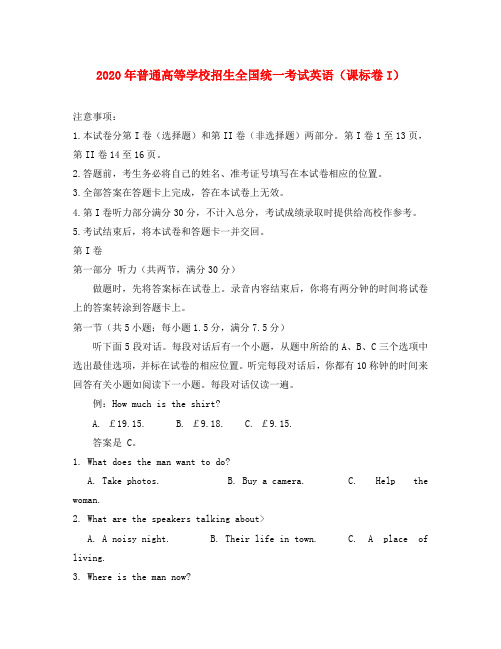
2020年普通高等学校招生全国统一考试英语(课标卷I)注意事项:1.本试卷分第I卷(选择题)和第II卷(非选择题)两部分。
第I卷1至13页,第II卷14至16页。
2.答题前,考生务必将自己的姓名、准考证号填写在本试卷相应的位置。
3.全部答案在答题卡上完成,答在本试卷上无效。
4.第I卷听力部分满分30分,不计入总分,考试成绩录取时提供给高校作参考。
5.考试结束后,将本试卷和答题卡一并交回。
第I卷第一部分听力(共两节,满分30分)做题时,先将答案标在试卷上。
录音内容结束后,你将有两分钟的时间将试卷上的答案转涂到答题卡上。
第一节(共5小题;每小题1.5分,满分7.5分)听下面5段对话。
每段对话后有一个小题,从题中所给的A、B、C三个选项中选出最佳选项,并标在试卷的相应位置。
听完每段对话后,你都有10称钟的时间来回答有关小题如阅读下一小题。
每段对话仅读一遍。
例:How much is the shirt?A. £19.15.B. £9.18.C. £9.15.答案是 C。
1. What does the man want to do?A. Take photos.B. Buy a camera.C. Help the woman.2. What are the speakers talking about>A. A noisy night.B. Their life in town.C. A place of living.3. Where is the man now?A. On his way.B. In a restaurant.C. At home4. What will Celia do?A. Find a player.B. Watch a game.C. Play basketball.5. What day is it when the conversation takes place?A. Saturday.B. Sunday.C. Monday.第二节(共15小题:每小题1.5分,满分22.5分)听下面5段对话或独白。
2020年全国普通高等学校招生统一考试(新课标Ⅰ卷)英语+答案+全解全析+听力原文纯word版(2020.6.15)
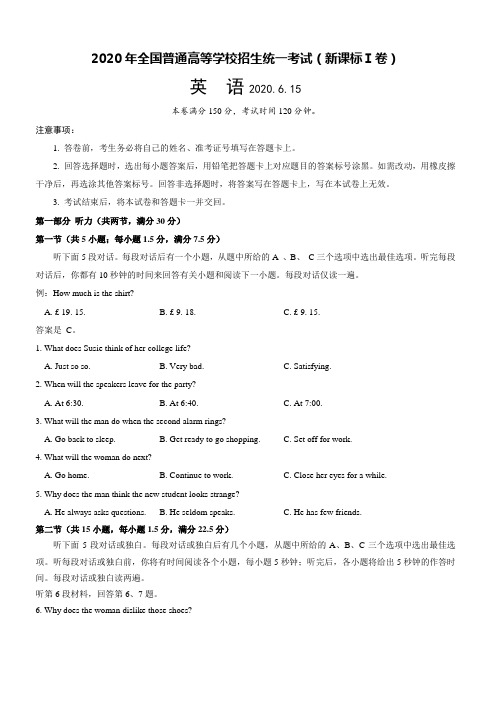
2020年全国普通高等学校招生统一考试(新课标Ⅰ卷)英语2020.6.15本卷满分150分,考试时间120分钟。
注意事项:1. 答卷前,考生务必将自己的姓名、准考证号填写在答题卡上。
2. 回答选择题时,选出每小题答案后,用铅笔把答题卡上对应题目的答案标号涂黑。
如需改动,用橡皮擦干净后,再选涂其他答案标号。
回答非选择题时,将答案写在答题卡上,写在本试卷上无效。
3. 考试结束后,将本试卷和答题卡一并交回。
第一部分听力(共两节,满分30分)第一节(共5小题;每小题1.5分,满分7.5分)听下面5段对话。
每段对话后有一个小题,从题中所给的A 、B、C三个选项中选出最佳选项。
听完每段对话后,你都有10秒钟的时间来回答有关小题和阅读下一小题。
每段对话仅读一遍。
例:How much is the shirt?A. £ 19. 15.B. £ 9. 18.C. £ 9. 15.答案是C。
1. What does Susie think of her college life?A. Just so so.B. Very bad.C. Satisfying.2. When will the speakers leave for the party?A. At 6:30.B. At 6:40.C. At 7:00.3. What will the man do when the second alarm rings?A. Go back to sleep.B. Get ready to go shopping.C. Set off for work.4. What will the woman do next?A. Go home.B. Continue to work.C. Close her eyes for a while.5. Why does the man think the new student looks strange?A. He always asks questions.B. He seldom speaks.C. He has few friends.第二节(共15小题,每小题1.5分,满分22.5分)听下面5段对话或独白。
(精编)2020年高考英语试卷(全国新高考Ⅰ卷)含答案
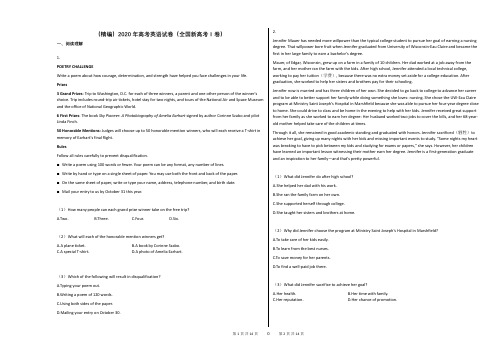
(精编)2020年高考英语试卷(全国新高考Ⅰ卷)一、阅读理解1.POETRY CHALLENGEWrite a poem about how courage, determination, and strength have helped you face challenges in your life.Prizes3 Grand Prizes: Trip to Washington, D.C. for each of three winners, a parent and one other person of the winner's choice. Trip includes round-trip air tickets, hotel stay for two nights, and tours of the National Air and Space Museum and the office of National Geographic World.6 First Prizes: The book Sky Pioneer: A Photobiography of Amelia Earhart signed by author Corinne Szabo and pilot Linda Finch.50 Honorable Mentions: Judges will choose up to 50 honorable mention winners, who will each receive a T-shirt in memory of Earhart's final flight.RulesFollow all rules carefully to prevent disqualification.■ Write a poem using 100 words or fewer. Your poem can be any format, any number of lines.■ Write by hand or type on a single sheet of paper. You may use both the front and back of the paper.■ On the same sheet of paper, write or type your name, address, telephone number, and birth date.■ Mail your entry to us by October 31 this year.(1)How many people can each grand prize winner take on the free trip?A.Two.B.Three.C.Four.D.Six.(2)What will each of the honorable mention winners get?A.A plane ticket.B.A book by Corinne Szabo.C.A special T-shirt.D.A photo of Amelia Earhart.(3)Which of the following will result in disqualification?A.Typing your poem out.B.Writing a poem of 120 words.ing both sides of the paper.D.Mailing your entry on October 30. 2.Jennifer Mauer has needed more willpower than the typical college student to pursue her goal of earning a nursing degree. That willpower bore fruit when Jennifer graduated from University of Wisconsin-Eau Claire and became the first in her large family to earn a bachelor's degree.Mauer, of Edgar, Wisconsin, grew up on a farm in a family of 10 children. Her dad worked at a job away from the farm, and her mother ran the farm with the kids. After high school, Jennifer attended a local technical college, working to pay her tuition(学费), because there was no extra money set aside for a college education. After graduation, she worked to help her sisters and brothers pay for their schooling.Jennifer now is married and has three children of her own. She decided to go back to college to advance her career and to be able to better support her family while doing something she loves: nursing. She chose the UW-Eau Claire program at Ministry Saint Joseph's Hospital in Marshfield because she was able to pursue her four-year degree close to home. She could drive to class and be home in the evening to help with her kids. Jennifer received great support from her family as she worked to earn her degree: Her husband worked two jobs to cover the bills, and her 68-year-old mother helped take care of the children at times.Through it all, she remained in good academic standing and graduated with honors. Jennifer sacrificed(牺牲)to achieve her goal, giving up many nights with her kids and missing important events to study. "Some nights my heart was breaking to have to pick between my kids and studying for exams or papers," she says. However, her children have learned an important lesson witnessing their mother earn her degree. Jennifer is a first-generation graduate and an inspiration to her family—and that's pretty powerful.(1)What did Jennifer do after high school?A.She helped her dad with his work.B.She ran the family farm on her own.C.She supported herself through college.D.She taught her sisters and brothers at home.(2)Why did Jennifer choose the program at Ministry Saint Joseph's Hospital in Marshfield?A.To take care of her kids easily.B.To learn from the best nurses.C.To save money for her parents.D.To find a well-paid job there.(3)What did Jennifer sacrifice to achieve her goal?A.Her health.B.Her time with family.C.Her reputation.D.Her chance of promotion.(4)What can we learn from Jennifer's story?A.Time is money.B.Love breaks down barriers.C.Hard work pays off.cation is the key to success.3.In the mid-1990s, Tom Bissell taught English as a volunteer in Uzbekistan. He left after seven months, physically broken and having lost his mind. A few years later, still attracted to the country, he returned to Uzbekistan to write an article about the disappearance of the Aral Sea.His visit, however, ended up involving a lot more than that. Hence this book, Chasing the Sea: Lost Among the Ghosts of Empire in Central Asia, which talks about a road trip from Tashkent to Karakalpakstan, where millions of lives have been destroyed by the slow drying up of the sea. It is the story of an American travelling to a strange land, and of the people he meets on his way: Rustam, his translator, a lovely 24-year-old who picked up his colorful English in California, Oleg and Natasha, his hosts in Tashkent, and a string of foreign aid workers.This is a quick look at life in Uzbekistan, made of friendliness and warmth, but also its darker side of society. In Samarkand, Mr Bissell admires the architectural wonders, while on his way to Bukhara he gets a taste of police methods when suspected of drug dealing. In Ferghana, he attends a mountain funeral(葬礼)followed by a strange drinking party. And in Karakalpakstan, he is saddened by the dust storms, diseases and fishing boats stuck miles from the sea.Mr Bissell skillfully organizes historical insights and cultural references, making his tale a well-rounded picture of Uzbekistan, seen from Western eyes. His judgment and references are decidedly American, as well as his delicate stomach. As the author explains, this is neither a travel nor a history book, or even a piece of reportage. Whatever it is, the result is a fine and vivid description of the purest of Central Asian traditions.(1)What made Mr Bissell return to Uzbekistan?A.His friends' invitation.B.His interest in the country.C.His love for teaching.D.His desire to regain health.(2)What does the underlined word "that" in paragraph 2 refer to?A.Developing a serious mental disease.B.Taking a guided tour in Central Asia.C.Working as a volunteer in Uzbekistan.D.Writing an article about the Aral Sea.(3)Which of the following best describes Mr Bissell's road trip in Uzbekistan?A.Romantic.B.Eventful.C.Pleasant.D.Dangerous. (4)What is the purpose of this text?A.To introduce a book.B.To explain a cultural phenomenon.C.To remember a writer.D.To recommend a travel destination.4.According to a recent study in the Journal of Consumer Research, both the size and consumption habits of our eating companions can influence our food intake. And contrary to existing research that says you should avoid eating with heavier people who order large portions (份), it's the beanpoles with big appetites you really need to avoid.To test the effect of social influence on eating habits, the researchers conducted two experiments. In the first, 95 undergraduate women were individually invited into a lab to ostensibly (表面上) participate in a study about movie viewership. Before the film began, each woman was asked to help herself to a snack. An actor hired by the researchers grabbed her food first. In her natural state, the actor weighed 105 pounds. But in half the cases she wore a specially designed fat suit which increased her weight to 180 pounds.Both the fat and thin versions of the actor took a large amount of food. The participants followed suit, taking more food than they normally would have. However, they took significantly more when the actor was thin.For the second test, in one case the thin actor took two pieces of candy from the snack bowls. In the other case, she took 30 pieces. The results were similar to the first test: the participants followed suit but took significantly more candy when the thin actor took 30 pieces.The tests show that the social environment is extremely influential when we're making decisions. If this fellow participant is going to eat more, so will I. Call it the "I'll have what she's having" effect. However, we'll adjust the influence. If an overweight person is having a large portion, I'll hold back a bit because I see the results of his eating habits. But if a thin person eats a lot, I'll follow suit. If he can eat much and keep slim, why can't I?(1)What is the recent study mainly about?A.Food safety.B.Movie viewership.C.Consumer demand.D.Eating behavior.(2)What does the underlined word "beanpoles" in paragraph 1 refer to?A.Big eaters.B.Overweight persons.C.Picky eaters.D.Tall thin persons.(3)Why did the researchers hire the actor?A.To see how she would affect the participants.B.To test if the participants could recognize her.C.To find out what she would do in the two tests.D.To study why she could keep her weight down.(4)On what basis do we "adjust the influence" according to the last paragraph?A.How hungry we are.B.How slim we want to be.C.How we perceive others.D.How we feel about the food.二、七选五5. 阅读下面短文,从短文后的选项中选出可以填入空白处的最佳选项。
2020年全国普通高等学校招生统一考试英语试卷 全国新高考Ⅰ卷 (含答案)

2020年全国普通高等学校招生统一考试试卷全国新高考Ⅰ卷英语注意事项:1. 答卷前, 考生务必将自己的姓名、准考证号填写在答题卡上。
2. 回答选择题时, 选出每小题答案后, 用铅笔把答题卡上对应题目的答案标号涂黑。
如需改动, 用橡皮擦干净后, 再选涂其他答案标号。
回答非选择题时, 将答案写在答题卡上, 写在本试卷上无效。
3. 考试结束后, 将本试卷和答题卡一并交回。
第一部分阅读(共两节, 满分50分)第一节(共15小题:每小题2.5分, 满分37.5分)阅读下列短文, 从每题所给的A、B、C、D四个选项中选出最佳选项。
APOETRY CHALLENGEWrite a poem about how courage, determination, and strength have helped you face challenges in your life.Prizes3 Grand Prizes:Trip to Washington, D.C. for each of three winners, a parent and one other person of the winner's choice. Trip includes round-trip air tickets, hotel stay for two nights, and tours of the National Air and Space Museum and the office of National Geographic World.6 First Prizes:The book Sky Pioneer:A Photobiography of Amelia Earhart signed by author Corinne Szabo and pilot Linda Finch.50 Honorable Mentions:Judges will choose up to 50 honorable mention winners, who will each receive a T-shirt in memory of Earhart's final flight.RulesFollow all rules carefully to prevent disqualification.■Write a poem using 100 words or fewer. Your poem can be any format, any number of lines.■Write by hand or type on a single sheet of paper. You may use both the front and back of the paper.■On the same sheet of paper, write or type your name, address, telephone number, and birth date.■Mail your entry to us by October 31 this year.1. How many people can each grand prize winner take on the free trip? ()A. Two.B. Three.C. Four.D. Six.2. What will each of the honorable mention winners get? ()A. A plane ticket.B. A book by Corinne Szabo.C. A special T-shirt.D. A photo of Amelia Earhart.3. Which of the following will result in disqualification? ()A. Typing your poem out.B. Writing a poem of 120 words.C. Using both sides of the paper.D. Mailing your entry on October 30.BJenifer Mauer has needed more willpower than the typical college student to pursue her goal of earning a nursing degree. That willpower bore fruit when Jennifer graduated from University of Wisconsin-Eau Claire and became the first in her large family to earn a bachelor's degree.Mauer, of Edgar, Wisconsin, grew up on a farm in a family of 10 children. Her dad worked at a job away from the farm, and her mother ran the farm with the kids. After high school, Jennifer attended a local technical college, working to pay her tuition(学费), because there was no extra money set aside for a college education. After graduation, she worked to help her sisters and brothers pay for their schooling.Jennifer now is married and has three children of her own. She decided to go back to college to advance her career and to be able to better support her family while doing something she loves: nursing. She chose the UW-Eau Claire program at Ministry Saint Joseph's Hospital in Marshfield because she was able to pursue her four-year degree close to home. She could drive to class and be home in the evening to help with her kids. Jenifer received great support from her family as she worked to car her degree: Her husband worked two jobs to cover the bills, and her 68-year-old mother helped take care of the children at times.Through it all, she remained in good academic standing and graduated with honors. Jennifer sacrificed(牺牲)to achieve her goal, giving up many nights with her kids and missing important events to study. “Some nights my heart was breaking to have to pick betw een my kids and studying for exams or papers,” she says. However, her children have learned an important lesson witnessing their mother earn her degree. Jennifer is a first-generation graduate and an inspirationto her family-and that's pretty powerful.4. What did Jennifer do after high school? ()A. She helped her dad with his work.B. She ran the family farm on her own.C. She supported herself through college.D. She taught her sisters and brothers at home.5. Why did Jennifer choose the program at Ministry Saint Joseph's Hospital in Marshfield? ()A. To take care of her kids easily.B. To learn from the best nurses.C. To save money for her parents.D. To find a well-paid job there.6. What did Jennifer sacrifice to achieve her goal? ()A. Her health.B. Her time with family.C. Her reputation.D. Her chance of promotion.7. What can we learn from Jenifer's story? ()A. Time is money.B. Love breaks down barriers.C. Hard work pays off.D. Education is the key to success.CIn the mid-1990s, Tom Bissell taught English as a volunteer in Uzbekistan. He left after seven months, physically broken and having lost his mind. A few years later, still attracted to the country, he returned to Uzbekistan to write an article about the disappearance of the Aral Sea.His visit, however, ended up involving a lot more than that. Hence this book, Chasing the Sea: Lost Among the Ghosts of Empire in Central Asia, which talks about a road trip from Tashkent to Karakalpakstan, where millions of lives have been destroyed by the slow drying up of the sea. It is the story of an American travelling to a strange land, and of the people he meets on his way: Rustam, his translator, a lovely 24-year-old who picked up his colorful English in California, Oleg and Natasha, his hosts in Tashkent, and a string of foreign aid workers.This is a quick look at life in Uzbekistan, made of friendliness and warmth, but also its darker side of society. In Samarkand, Mr Bissell admires the architectural wonders, while on his way to Bukhara he gets a taste of police methods when suspected of drug dealing. In Ferghana, he attends a mountain funeral(葬礼)followed by a strange drinking party. And in Karakalpakstan, he issaddened by the dust storms, diseases and fishing boats stuck miles from the sea.Mr Bissell skillfully organizes historical insights and cultural references, making his tale a well-rounded picture of Uzbekistan, seen from Western eyes. His judgment and references are decidedly American, as well as his delicate stomach. As the author explains, this is neither a travel nor a history book, or even a piece of reportage. Whatever it is, the result is a fine and vivid description of the purest of Central Asian traditions.8. What made Mr Bissell return to Uzbekistan? ()A. His friends' invitation.B. His interest in the country.C. His love for teaching.D. His desire to regain health.9. What does the underlined word “that” in paragraph 2 refer to? ()A. Developing a serious mental disease.B. Taking a guided tour in Central Asia.C. Working as a volunteer in Uzbekistan.D. Writing an article about the Aral Sea.10. Which of the following best describes Mr Bissell's road trip in Uzbekistan? ()A. Romantic.B. Eventful.C. Pleasant.D. Dangerous.11. What is the purpose of this text? ()A. To introduce a book.B. To explain a cultural phenomenon.C. To remember a writer.D. To recommend a travel destination.DAccording to a recent study in the Journal of Consumer Research, both the size and consumption habits of our eating companions can influence our food intake. And contrary to existing research that says you should avoid eating with heavier people who order large portions (份), it's the beanpoles with big appetites you really need to avoid.To test the effect of social influence on eating habits, the researchers conducted two experiments. In the first, 95 undergraduate women were individually invited into a lab to ostensibly(表面上)participate in a study about movie viewership. Before the film began, each woman was asked to help herself to a snack. An actor hired by the researchers grabbed her food first. In her natural state, the actor weighed 105 pounds. But in half the cases she wore a specially designed fat suit which increased her weight to 180 pounds.Both the fat and thin versions of the actor took a large amount of food. The participants followed suit, taking more food than they normally would have. However, they took significantly more when the actor was thin.For the second test, in one case the thin actor took two pieces of candy from the snack bowls. In the other case, she took 30 pieces. The results were similar to the first test: the participants followed suit but took significantly more candy when the thin actor took 30 pieces.The tests show that the social environment is extremely influential when we're making decisions. If this fellow participant is going to eat more, so will I. Call it the “I’ll have what she's having” effe ct. However, we'll adjust the influence. If an overweight person is having a large portion, I'll hold back a bit because I see the results of his eating habits. But if a thin person eats a lot, I'll follow suit. If he can eat much and keep slim, why can't I?12. What is the recent study mainly about? ()A. Food safety.B. Movie viewership.C. Consumer demand.D. Eating behavior.13. What does the underlined word "beanpoles" in paragraph 1 refer to? ()A. Big eaters.B. Overweight persons.C. Picky eaters.D. Tall thin persons.14. Why did the researchers hire the actor? ()A. To see how she would affect the participants.B. To test if the participants could recognize her.C. To find out what she would do in the two tests.D. To study why she could keep her weight down.15. On what basis do we "adjust the influence" according to the last paragraph? ()A. How hungry we are.B. How slim we want to be.C. How we perceive others.D. How we feel about the food.第二节(共5小题:每小题2. 5分, 满分12. 5分)阅读下面短文, 从短文后的选项中选出可以填入空白处的最佳选项。
2020年普通高等学校招生全国统一考试英语试题新课标1卷,含解析

2020年普通高等学校招生全国统一考试英语试题新课标1卷,含解析2020年的全国统一考试英语试题新课标1卷是备受关注的学术考试之一。
本次试题将涵盖最新的英语课标和解析,帮助考生更好地了解考试内容和解题思路。
第一部分:听力理解(共20小题;每小题1.5分,满分30分)本部分主要考察考生对英语听力的理解能力。
通过听录音,选择正确的答案或完成相关任务。
第二部分:阅读理解(共两节;每小题2.5分,满分50分)本部分共有35小题,分为两节,主要考察考生的阅读理解能力以及推理判断能力。
每小题都附有四个选项,考生需阅读问题和相关文章,选择最佳答案。
第三部分:语言知识运用(共两节;每小题2.5分,满分50分)本部分共有35小题,分为两节。
第一节考察考生的词汇和语法知识,第二节则侧重于语篇填空,考察考生对上下文语境的理解和句子结构的运用。
第四部分:写作(共三节,满分50分)本部分主要考察考生的写作能力。
第一节为短文改错,考生需要根据错误标记改正短文中的语法错误。
第二节为书面表达,考生需根据所给的题目写一篇约120词的短文。
最后一节是任务型阅读,考生需根据所给的材料完成相关任务,如填写表格,回答问题等。
在本次试题中,各次部分难度逐渐增加。
通过完成试题,考生能够全面检测自身的英语听说读写能力。
同时,试题中附有详细的解析,帮助考生理解解题思路和方法。
在备考过程中,考生可以通过模拟试卷来熟悉考试形式和题型,并进行针对性的训练和复习。
同时,多做真题和模拟题,加强对各个知识点的掌握和理解。
总之,2020年普通高等学校招生全国统一考试英语试题新课标1卷是一次重要的考试,也是考生展示自己英语能力的机会。
仔细阅读并理解试题要求,认真复习每个知识点,在考试中保持冷静和清晰的思维,相信你一定会取得理想的成绩。
祝各位考生成功!。
2020年全国普通高等学校招生统一考试英语试卷 全国新高考Ⅰ卷 (含答案)

2020年全国普通高等学校招生统一考试试卷全国新高考Ⅰ卷英语注意事项:1. 答卷前, 考生务必将自己的姓名、准考证号填写在答题卡上。
2. 回答选择题时, 选出每小题答案后, 用铅笔把答题卡上对应题目的答案标号涂黑。
如需改动, 用橡皮擦干净后, 再选涂其他答案标号。
回答非选择题时, 将答案写在答题卡上, 写在本试卷上无效。
3. 考试结束后, 将本试卷和答题卡一并交回。
第一部分阅读(共两节, 满分50分)第一节(共15小题:每小题2.5分, 满分37.5分)阅读下列短文, 从每题所给的A、B、C、D四个选项中选出最佳选项。
APOETRY CHALLENGEWrite a poem about how courage, determination, and strength have helped you face challenges in your life.Prizes3 Grand Prizes:Trip to Washington, D.C. for each of three winners, a parent and one other person of the winner's choice. Trip includes round-trip air tickets, hotel stay for two nights, and tours of the National Air and Space Museum and the office of National Geographic World.6 First Prizes:The book Sky Pioneer:A Photobiography of Amelia Earhart signed by author Corinne Szabo and pilot Linda Finch.50 Honorable Mentions:Judges will choose up to 50 honorable mention winners, who will each receive a T-shirt in memory of Earhart's final flight.RulesFollow all rules carefully to prevent disqualification.■Write a poem using 100 words or fewer. Your poem can be any format, any number of lines.■Write by hand or type on a single sheet of paper. You may use both the front and back of the paper.■On the same sheet of paper, write or type your name, address, telephone number, and birthdate.■Mail your entry to us by October 31 this year.1. How many people can each grand prize winner take on the free trip? ()A. Two.B. Three.C. Four.D. Six.2. What will each of the honorable mention winners get? ()A. A plane ticket.B. A book by Corinne Szabo.C. A special T-shirt.D. A photo of Amelia Earhart.3. Which of the following will result in disqualification? ()A. Typing your poem out.B. Writing a poem of 120 words.C. Using both sides of the paper.D. Mailing your entry on October 30.BJenifer Mauer has needed more willpower than the typical college student to pursue her goal of earning a nursing degree. That willpower bore fruit when Jennifer graduated from University of Wisconsin-Eau Claire and became the first in her large family to earn a bachelor's degree.Mauer, of Edgar, Wisconsin, grew up on a farm in a family of 10 children. Her dad worked at a job away from the farm, and her mother ran the farm with the kids. After high school, Jennifer attended a local technical college, working to pay her tuition(学费), because there was no extra money set aside for a college education. After graduation, she worked to help her sisters and brothers pay for their schooling.Jennifer now is married and has three children of her own. She decided to go back to college to advance her career and to be able to better support her family while doing something she loves: nursing. She chose the UW-Eau Claire program at Ministry Saint Joseph's Hospital in Marshfield because she was able to pursue her four-year degree close to home. She could drive to class and be home in the evening to help with her kids. Jenifer received great support from her family as she worked to car her degree: Her husband worked two jobs to cover the bills, and her 68-year-old mother helped take care of the children at times.Through it all, she remained in good academic standing and graduated with honors. Jennifer sacrificed(牺牲)to achieve her goal, giving up many nights with her kids and missing important events to study. “Some nights my heart was breaking to have to pick between my kids and studying for exams or papers,” she says. However, her children have learned an important lessonwitnessing their mother earn her degree. Jennifer is a first-generation graduate and an inspiration to her family-and that's pretty powerful.4. What did Jennifer do after high school? ()A. She helped her dad with his work.B. She ran the family farm on her own.C. She supported herself through college.D. She taught her sisters and brothers at home.5. Why did Jennifer choose the program at Ministry Saint Joseph's Hospital in Marshfield? ()A. To take care of her kids easily.B. To learn from the best nurses.C. To save money for her parents.D. To find a well-paid job there.6. What did Jennifer sacrifice to achieve her goal? ()A. Her health.B. Her time with family.C. Her reputation.D. Her chance of promotion.7. What can we learn from Jenifer's story? ()A. Time is money.B. Love breaks down barriers.C. Hard work pays off.D. Education is the key to success.CIn the mid-1990s, Tom Bissell taught English as a volunteer in Uzbekistan. He left after seven months, physically broken and having lost his mind. A few years later, still attracted to the country, he returned to Uzbekistan to write an article about the disappearance of the Aral Sea.His visit, however, ended up involving a lot more than that. Hence this book, Chasing the Sea: Lost Among the Ghosts of Empire in Central Asia, which talks about a road trip from Tashkent to Karakalpakstan, where millions of lives have been destroyed by the slow drying up of the sea. It is the story of an American travelling to a strange land, and of the people he meets on his way: Rustam, his translator, a lovely 24-year-old who picked up his colorful English in California, Oleg and Natasha, his hosts in Tashkent, and a string of foreign aid workers.This is a quick look at life in Uzbekistan, made of friendliness and warmth, but also its darker side of society. In Samarkand, Mr Bissell admires the architectural wonders, while on his way to Bukhara he gets a taste of police methods when suspected of drug dealing. In Ferghana, he attendsa mountain funeral(葬礼)followed by a strange drinking party. And in Karakalpakstan, he is saddened by the dust storms, diseases and fishing boats stuck miles from the sea.Mr Bissell skillfully organizes historical insights and cultural references, making his tale a well-rounded picture of Uzbekistan, seen from Western eyes. His judgment and references are decidedly American, as well as his delicate stomach. As the author explains, this is neither a travel nor a history book, or even a piece of reportage. Whatever it is, the result is a fine and vivid description of the purest of Central Asian traditions.8. What made Mr Bissell return to Uzbekistan? ()A. His friends' invitation.B. His interest in the country.C. His love for teaching.D. His desire to regain health.9. What does the underlined word “that” in paragraph 2 refer to? ()A. Developing a serious mental disease.B. Taking a guided tour in Central Asia.C. Working as a volunteer in Uzbekistan.D. Writing an article about the Aral Sea.10. Which of the following best describes Mr Bissell's road trip in Uzbekistan? ()A. Romantic.B. Eventful.C. Pleasant.D. Dangerous.11. What is the purpose of this text? ()A. To introduce a book.B. To explain a cultural phenomenon.C. To remember a writer.D. To recommend a travel destination.DAccording to a recent study in the Journal of Consumer Research, both the size and consumption habits of our eating companions can influence our food intake. And contrary to existing research that says you should avoid eating with heavier people who order large portions (份), it's the beanpoles with big appetites you really need to avoid.To test the effect of social influence on eating habits, the researchers conducted two experiments. In the first, 95 undergraduate women were individually invited into a lab to ostensibly(表面上)participate in a study about movie viewership. Before the film began, each woman was asked to help herself to a snack. An actor hired by the researchers grabbed her food first. In her natural state, the actor weighed 105 pounds. But in half the cases she wore a speciallydesigned fat suit which increased her weight to 180 pounds.Both the fat and thin versions of the actor took a large amount of food. The participants followed suit, taking more food than they normally would have. However, they took significantly more when the actor was thin.For the second test, in one case the thin actor took two pieces of candy from the snack bowls. In the other case, she took 30 pieces. The results were similar to the first test: the participants followed suit but took significantly more candy when the thin actor took 30 pieces.The tests show that the social environment is extremely influential when we're making decisions. If this fellow participant is going to eat more, so will I. Call it the “I’ll have what she's having” effect. However, we'll adjust the influence. If an overweight person is having a large portion, I'll hold back a bit because I see the results of his eating habits. But if a thin person eats a lot, I'll follow suit. If he can eat much and keep slim, why can't I?12. What is the recent study mainly about? ()A. Food safety.B. Movie viewership.C. Consumer demand.D. Eating behavior.13. What does the underlined word "beanpoles" in paragraph 1 refer to? ()A. Big eaters.B. Overweight persons.C. Picky eaters.D. Tall thin persons.14. Why did the researchers hire the actor? ()A. To see how she would affect the participants.B. To test if the participants could recognize her.C. To find out what she would do in the two tests.D. To study why she could keep her weight down.15. On what basis do we "adjust the influence" according to the last paragraph? ()A. How hungry we are.B. How slim we want to be.C. How we perceive others.D. How we feel about the food.第二节(共5小题:每小题2. 5分, 满分12. 5分)阅读下面短文, 从短文后的选项中选出可以填入空白处的最佳选项。
2020年高考英语试卷全国卷I(新课标Ⅰ)(word解析版)
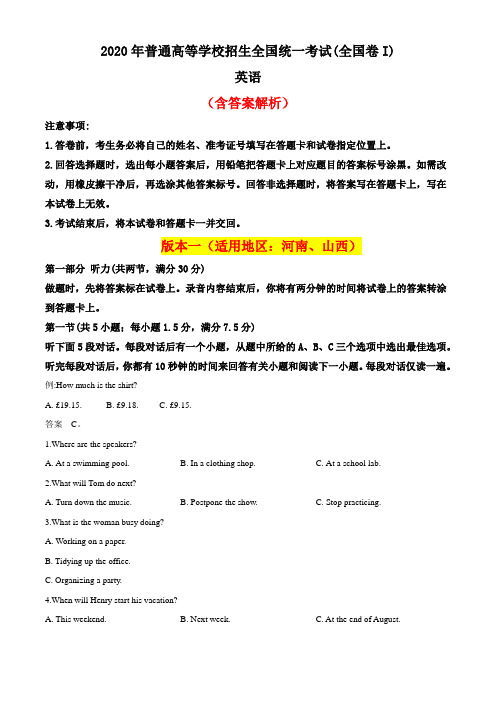
A. A restaurant.
B. A laundry.
C. A grocery store.
15. Which is included in the rent?
A. Electricity.
B. The Internet.
听下面一段较长对话,回答以下小题。
11 How did the man feel about his performance today?
A. Greatly encouraged.
B. A bit dissatisfied.
C. Terat did the man say helped him overcome the problem?
A. Forgiving.B. Sympathetic.C. Supportive.
10. What might Cathy do for the present company?
A. Apply for a project.B. Train a new person.C. Recommend an engineer.
C. Satellite TV.
16. What does the woman think of the apartment?
A. It’s quite large.
B. It’s well furnished.
C. It’s worth the money.
听下面一段独白,回答以下小题
17. Where is Jeff from?
A. Turn down the music.B. Postpone the show.C. Stop practicing.
- 1、下载文档前请自行甄别文档内容的完整性,平台不提供额外的编辑、内容补充、找答案等附加服务。
- 2、"仅部分预览"的文档,不可在线预览部分如存在完整性等问题,可反馈申请退款(可完整预览的文档不适用该条件!)。
- 3、如文档侵犯您的权益,请联系客服反馈,我们会尽快为您处理(人工客服工作时间:9:00-18:30)。
2020年全国统一高考英语试卷(新课标Ⅰ)副标题一、阅读理解(本大题共15小题,共30.0分)ATrain InformationAll customers travelling on TransLink services must be in possession of a valid ticket before boarding.For ticket information,please ask at your local station or call 131230.While Queensland Rail makes every effort to ensure trains run as scheduled,there can be no guarantee of connections between trains or between train services and bus services.Lost property(失物招领)Call Lost Property on 13 16 17 during business hours for items lost on Queensland Rail services.The lost property office is open Monday to Friday 7:30am to 5:00pm and is located (位于)at Roma Street station.Public holidaysOn public holidays,generally a Sunday timetable operates.On certain major event days,i.e.Australia Day,Anzac Day,sporting and cultural days,special additional services may operate.Christmas Day services operate to a Christmas Day timetable.Before travel please visit translink.com.au or call TransLink on 13 12 30 anytime.Customers using mobility devicesMany stations have wheelchair access from the car park or entrance to the station platforms.For assistance,please call Queensland Rail on 13 16 17.Guardian trains(outbound)1.What would you do to get ticket information?A. Call 13 16 17.B. Visit translink.com.au.C. Ask at the local station.D. Check the train schedule.2.At which station can you find the lost property office?A. Altandi.B. Roma Street.C. Varsity Lakes.D. Fortitude Valley.3.Which train would you take if you go from Central to Varsity Lakes?A. 6:42pm.B. 7:29pm.C. 8:57pm.D. 11:02pm.【答案】【小题1】C 【小题2】B 【小题3】B【解析】1.根据第一段的For ticket information,please ask at your local station or call 131230.如需了解车票信息,请向当地车站查询或拨打131230。
可知,想得到票务信息的话,可以询问当地火车站。
故选C。
2.根据Lost property这部分的The lost property office is open Monday to Friday 7:30am to 5:00pm and is located (位于)at Roma Street station.失物招领处星期一至星期五每天早上7:30—下午5:00开放,位于罗马街车站。
可知,在罗马街车站可以找到失物招领处。
故选B。
3.根据Guardian trains (outbound)的表格第三行7:29pm—Central—Varsity Lakes可知,如果你从中环去大学湖,你会坐晚上7:29的车。
故选B。
BReturning to a book youˈve read many times can feel like drinks with an old friend.Thereˈs a welcome familarity—but also sometimes a slight suspicion that time has changed you both,and thus the relationship.But books donˈt change,people do.And th atˈs what makes the act of rereading so rich and transformative.The beauty of rereading lies in the idea that our bond with the work is based on our present mental register.Itˈs true,the older I get,the more I feel time has wings.But with reading,itˈs all about the present.Itˈs about the now and what one contributes to the now,because reading is a give and take between author and reader.Each has to pull their own weight.There are three books I reread annually.The first,which I take to reading every spring,is Ernest Hemingwayˈs A Moveable Feast.Published in 1964,itˈs his classic memoir of 1920s Paris.The language is almost intoxicating(令人陶醉的),an aging writer looking back on an ambitious yet simpler time.Another is Annie Dillardˈs Holy the Firm,her poetic 1975 ramble(随笔)about everything and nothing.The third book is Julio Cortázarˈs Save Twilight:Selected Poems,because poetry.And because Cortázar.While I tend to buy a lot of books,these three were given to me as gifts,which might add to the meaning I attach to them.But I imagine that,while money is indeed wonderful and necessary,rereading an authorˈs work is the highest currency a reader can pay them.The best books are the ones that open further as time passes.But remember,itˈs you that has to grow and read and reread in order to better understand your friends.4.Why does the author like rereading?A. It evaluates the writer﹣reader relationship.B. Itˈs a window to a whole new world.C. Itˈs a substitute for drinking with a friend.D. It extends the understanding of oneself.5.What do we know about the book A Moveable Feast?A. Itˈs a brief account of a trip.B. Itˈs about Hemingwayˈs life as a young man.C. Itˈs a record of a historic event.D. Itˈs about Hemingwayˈs friends in Paris.6.What does the underlined word "currency" in paragraph 4 refer to?A. Debt.B. Reward.C. Allowance.D. Face value.7.What can we infer about the author from the text?A. He loves poetry.B. Heˈs an editor.C. Heˈs very ambitious.D. He teaches reading.【答案】【小题1】D 【小题2】B 【小题3】B 【小题4】A【解析】1.根据文章第一段,But books don't change,people do.And that's what makes the act of rereading so rich and transformative.但是书没变,人变了。
